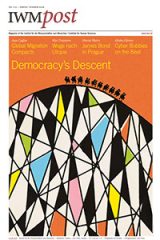

In collaboration with
Institute for Human Sciences
The Institute for Human Sciences / Institut für die Wissenschaften vom Menschen (IWM) is an independent institute for advanced study in the humanities and social sciences. Since its foundation in 1982, it has hosted more than 1500 scholars, journalists and translators from all over the world. Many of the Institute’s Permanent and Visiting Fellows are regular contributors to Eurozine or its focal points The World in Pieces and Ukraine in European Dialogue (see below).
Website: www.iwm.at
Twitter: @IWM_Vienna
Youtube: IWMVienna

Articles
Why Ukrainians Are Ukrainians
A Commentary on Mykola Riabchuk's "Ukraine: One State, two Countries"?
Roman Szporluk comments in this text on Mykola Riabchuk’s concept of ‘ambivalence’ in the Ukraine. The divide betweeen Western and Eastern Ukraine and the resulting ‘ambivalence’ have to be understood in more historical terms: Ukraine has only existed as a political entity since 1991 in contrast to other post – Soviet countries.Therefore, nation building and the emergence of a civil society will take more time.
Political ambivalence as a socio-political phenomenon characterizes virtually every post-communist country but especially the Ukraine. Here, the country’s regional, cultural and linguistic discrepancies and the atomizing impact of Soviet totalitarianism on Ukrainian society serve to explain the deep socio-political rifts within. Mykola Riabchuk argues that the post-Soviet elite currently in power cunningly uses this situation for its political survival. Will the Ukraine be able to overcome this ambivalence and usher into an era of more democratic plurality and subsequent unity?
Analysing the process of reconciliation with the Communist past in Russia during the decade from the fall of Communism to the turn of the century, Alexei Miller finds that many of the most painful problems have not been touched on and it would be optimistic to say that Russia has to a fair degree extricated itself from communism in this respect. However, one should not forget, that, viewed from the point of its beginning, it has been an extraordinary process.
Over the last quarter century, every country, every social, ethnic or family group, has undergone a profound change in the relationship it traditionally enjoyed with the past. Pierre Nora looks at where this “memorialism” came from and why.
Focal points

Inspired by a lecture that Clifford Geertz delivered in 1995 at the Institute for Human Sciences in Vienna, this focal point engages with ‘deep diversity’, ‘a sense of dispersion, of particularity, of complexity and of uncenteredness’ rather than unified world order. It follows the launch of a research programme of the same name at the institute in January 2023.

Post-revolutionary Ukrainian society displays a unique mix of hope, enthusiasm, social creativity, collective trauma of war, radicalism and disillusionment. With the Maidan becoming history, the focal point ‘Ukraine in European Dialogue’ explores the new challenges facing the young democracy, its place in Europe, and the lessons it might offer for the future of the European project.
Projects and publications

